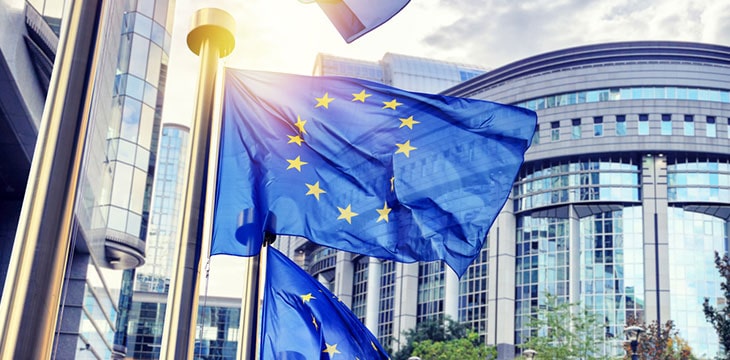|
Getting your Trinity Audio player ready...
|
Lawmakers in the European Union have overwhelmingly voted in favor of proposed data legislation on Tuesday, which makes express provision for data sharing via smart contracts as part of an overall effort to ‘unlock’ the untapped potential of industrial data and give users of IoT devices the right to access and share the data to which they have contributed.
The Data Act was initially proposed in February and was intended to promote fairness in the digital world, stimulate a competitive data market, open opportunities for data-driven innovation, and make data more accessible for all. It covers some of the same ground as the European General Data Protection Regulation (GDPR), but is focused on non-personal data and clearing the way for it to be used to enable innovation, as opposed to the more personal data protection-focused GDPR.
According to the European Commission, the volume of data is expected to grow from 33 zettabytes produced in 2018 to 175 zettabytes in 2025. The EC says that 80% of industrial data is never used despite this abundance of data. The proposed rules are intended to help harness this data and create €270 billion ($287 billion) of additional GDP by 2028.
Thierry Breton, European Commissioner for Internal Market, said the Act was “an important step in unlocking a wealth of industrial data in Europe, benefitting businesses, consumers, public services and society as a whole.”
“So far, only a small part of industrial data is used and the potential for growth and innovation is enormous. The Data Act will ensure that industrial data is shared, stored and processed in full respect of European rules,” the EU press release read.
As such, the Act focuses on innovation rather than protection. Though not explicitly aimed at blockchain technology, Article 30 of the Act covers “essential requirements regarding smart contracts for data sharing.” Under this Article, several ‘essential’ requirements are spelled out for when smart contracts are offered in the context of an agreement to make data available.
Parties must ensure that the smart contract has been designed to offer ‘rigorous access control mechanisms’ and a ‘very high degree of robustness’ to avoid errors and stand up to manipulation by third parties.
There must also be mechanisms in place to terminate the continued execution of transactions, such as internal functions to reset or instruct the contract to stop. There should also be a clear definition of the conditions under which a smart contract can be reset or instructed to stop.
Smart contracts are also required to “afford the same level of protection and legal certainty as any other contracts generated through different means.”
They should also be designed to ensure the confidentiality of trade secrets.
The provisions are far from a rigorous engagement with smart contracts and their legal implications, but they do indicate that European lawmakers are keeping one eye fixed firmly on the blockchain world as they go about regulating the Union. Whether these limited provisions are fit for purpose will be subject to much debate; it seems likely that the imposition of requirements around the suspension of smart contracts will be seen as an undermining of the benefits they offer in the eyes of some.
Having been approved by the European Parliament, the text will now be sent to the EU Council and European Commission for negotiations. The first round of negotiations has been scheduled for March 28.
Watch: BSV On-chain Ecosystem Development in Europe
Recommended for you
British lawmakers of the parliamentary national security committee have called for a temporary ban on political parties receiving donations in
Circle (NASDAQ: CRCL) soared in 2025 thanks to U.S. ‘regulatory clarity,’ but can this momentum survive a ban on crypto

 02-26-2026
02-26-2026 




